Search Results
Showing results 1 to 20 of 46
One-Cut Paper Stars
Source Institutions
Here's a very simple activity if you have paper and scissors: make one cut, unfold, and you have a beautiful star! A great way to learn about polygons and origami mathematics.
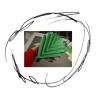
Paper Folding: Unfurling Geometric Paper Shapes
Source Institutions
Use geometry, a ruler, and a steady hand to create these amazing unfurling paper folds!
Mission Insignia
Source Institutions
In this science/art activity, learners create an insignia or emblem for a planet exploration mission.
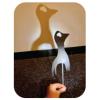
Shadow Puppets
Source Institutions
In this activity, learners will create their own simple shadow puppets, and experiment with light and shadow while playing with them.
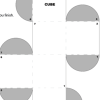
Fold a Crystal
Source Institutions
Rocks are made of minerals, and minerals often have crystal shapes. In this fun activity about geometry in nature, learners create their own crystal shapes out of paper.
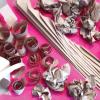
Paper Sculptures
Source Institutions
In this activity, learners manipulate paper to build original 3-dimensional sculptures. Appropriate for any age, learners can use fingers to tear, crumple, or fold, and if available, scissors to cut.
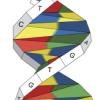
Origami DNA
Source Institutions
In this activity, learners create an origami model of DNA, demonstrating its double helix structure.
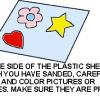
Shrinking Polymers
Source Institutions
In this activity, learners discover that some plastics will shrink when you get them hot. Learners bake polystyrene in a regular oven and discover what happens.
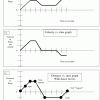
Graph Dance
Source Institutions
In this activity, learners "dance" (move back and forth at varying speeds) by reading a graph. This is a kinesthetic way to help learners interpret and understand how motion is graphed.
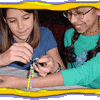
Wear a Chimp on Your Wrist
Source Institutions
Learners construct a bracelet containing two strands of beads, which represents a double strand of DNA that codes for a gene. They match beads to the bases in a section of a chimp's DNA code.
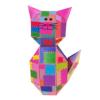
Patches the Cat: A Print-and-Build Paper Sculpture Kit
Source Institutions
In this activity, learners get hands-on with geometry by making a polyhedron kitty sculpture.
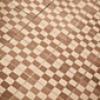
Twisted Tesselations
Source Institutions
In this activity (on pages 41-47 of PDF), learners explore tesselating geometric patterns (repeated shapes, similar to the art of M.C. Escher).

Building a 3-D Space Maze: Escher Staircase
Source Institutions
In this activity (page 95 of the PDF), learners create Escher Staircase models similar to those that were used by Neurolab's Spatial Orientation Team to investigate the processing of information about
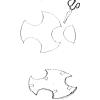
Zoom-A-Rang
Source Institutions
In this activity, learners design and build a Zoom-a-rang using everyday materials. Experiment with different materials and Zoom-a-rang designs to see how they fly.
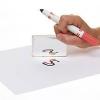
Mirror, Mirror
Source Institutions
In this activity, learners discover that it is difficult to trace a curve by using its reflection in a mirror. Use this activity to discuss how the brain works.

Nature Journals
Source Institutions
In this activity, learners construct a home-made journal with simple, everyday materials.
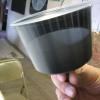
Mini Zoetrope
Source Institutions
In this activity (posted on March 27, 2011), learners follow the steps to construct a mini zoetrope, a device that produces an illusion of action from a rapid succession of static pictures.
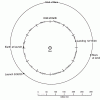
Getting There!: Navigation and Trajectory
Source Institutions
In this two-part activity, learners map a navigation plan to get from Earth to Mars and back. In activity one, learners represent the orbital paths of Earth through dance and dramatic movement.
Shadow Puppets
Source Institutions
If you have lights, cardboard, scissors, and some brass fasteners, you can make shadow puppets! Create a story-telling and design challenge for your learners with this simple and creative activity.
Magnus Glider
Source Institutions
A design challenge that takes paper airplanes into an entirely different direction: a magnus glider uses cups and and rubber bands to create a glider that uses the same forces that a curveball (from b
